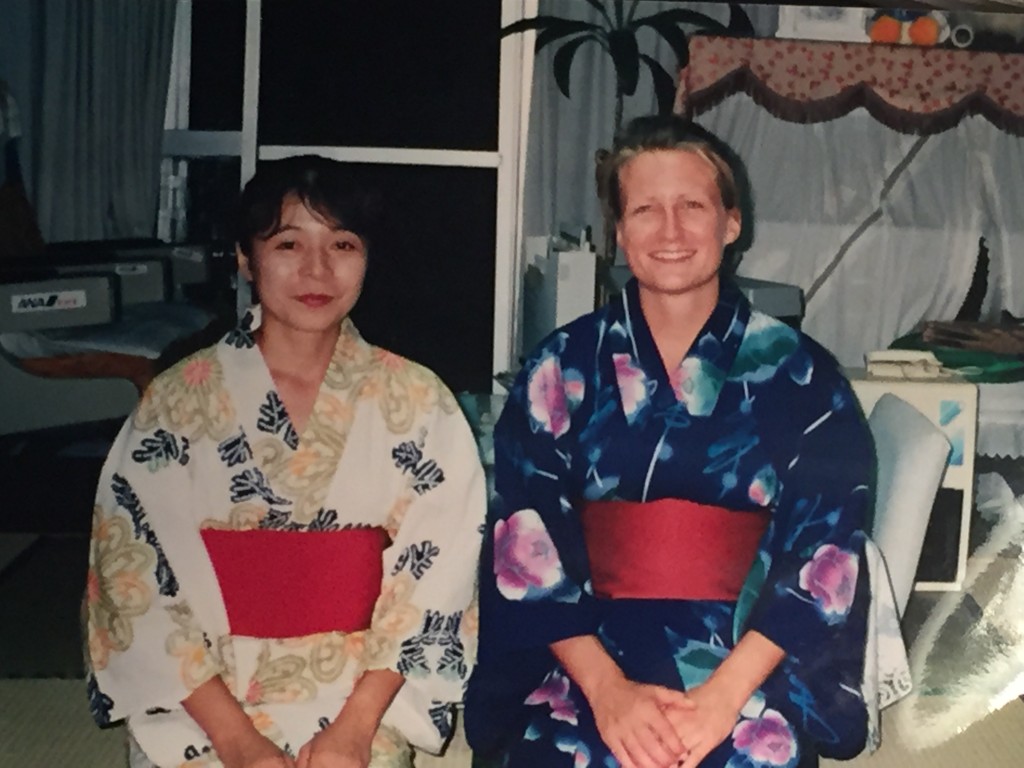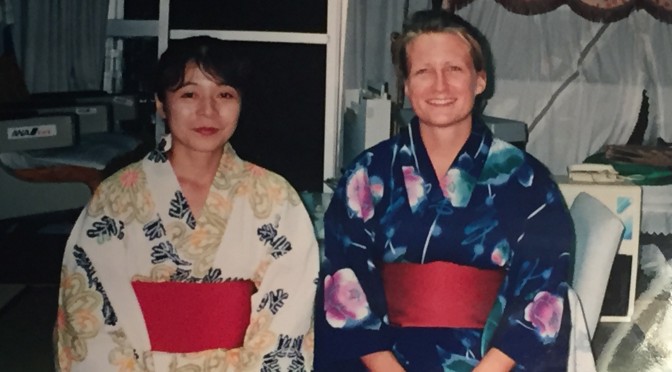When I was 23, fresh out of college, and didn’t know that there was anything I couldn’t do, I moved to Japan. By myself.
I only knew one person, one of the administrators at the college where I would eventually work, through my sister-in-law who had coordinated the US side of an established summer student exchange program. When I was in college, Takashi invited me over to work and teach.
I was single, didn’t know the language, and I wanted to travel without having to raise money as a missionary. This was a perfect chance to live overseas, have a home base to travel from, and not have to raise money. Weeks before I went over there, I bought a pocket book that featured some basic vocabulary and a rudimentary explanation of the syllabic nature of Japanese.
Within a couple of weeks, I could phonetically read hiragana and katakana, the most accessible of the three alphabet groups that make up the Japanese language. I was addicted to vending machines once I could locate miruku te (milk tea). I’m a firm believer that there are a few things you should be able to say in any language. For example:
Oteire wa doko ni arimasuka = Where is the toilet?
Besides knowing that there would be some other English speaking teachers, I didnt know anything else. I didn’t know where I was going to live, for example, or how I was going to furnish my apartment. I had no idea what to expect or whom I would meet.
Big. Black. Hole. Of. Unknown.
The concept of preparation didn’t figure into my plans. With fewer than three months to get ready to move overseas, there was not time for anxiety to creep in. I just had to execute: get a passport and a travel visa, pack some clothes, visit friends before I left.
BOOM.
I signed up for two years and ended up staying 4.5 years. I took risks I would have my children institutionalized for taking. I learned a few things that I am still using in my Soul Journey.
Lesson 1 People help you
The first Christmas there, I took a multi-country a trip to visit a university friend living in Bangkok. I landed in Singapore, took a train to Malacca, Malaysia, and then took a taxi to the interior to visit an Orang Asli tribe. I found a couple who was traveling to accompany me and we were welcomed by the medicine man of the tribe. I lost count of days. Returning from the interior, I was back at the guest house, getting ready for the last day of my time in Malaysia. As I was journaling about the trip, I realized I had missed my bus back to Singapore that day. At 8 PM, the hostess summoned up the same taxi driver who had taken me into the jungle to drive me another two hours into the interior of the country so that I could catch the last train back to Singapore in time for my flight the next morning.
I stood the entire ride back. I don’t know what those people wrote on the papers they told me to hand to the people at the train window, but I think they got me on when there weren’t actually any seats left. I didn’t know the language. I was scarcely familiar with the coinage. I didn’t even know there was a train in the interior and I certainly wouldn’t have been able to figure out how to get to it or negotiate that last minute ticket and I’m talking like seven minutes of time to spare before the train showed up at the station.
School kids practiced their English on me and old women carrying chickens in cages alternately clucked their heads or smiled. Id missed the bus by a day. But there I was in the middle of a foreign jungle with ABSOLUTELY NO LANGUAGE skills or connections, and an entire car of train riders looked out for me. I made my flight to Bangkok.
Lesson 2 Invest in the people who stick
After the first wave of expatriates I had made friends with left the country, undermining the delicate social web Id constructed, I began to accept invitations from some of my students and co-workers.  They warmly embraced me, and let me into their worlds. I got to visit their family homes in the country, attend weddings and community celebrations in my yukata. I planted rice barefoot in a rice paddy, ate chicken voice box and rattlesnake, and rode my first sailboard directly into the side of a boat. I learned first hand, that too much seaweed salad and that much Ouzo do not friendly bedfolks make. I made friends with the older gentlemen who manned the subway stations and practiced my emergent Japanese on them. I chatted with school kids on the subway. I walked around shrines by myself and paid my respects.
They warmly embraced me, and let me into their worlds. I got to visit their family homes in the country, attend weddings and community celebrations in my yukata. I planted rice barefoot in a rice paddy, ate chicken voice box and rattlesnake, and rode my first sailboard directly into the side of a boat. I learned first hand, that too much seaweed salad and that much Ouzo do not friendly bedfolks make. I made friends with the older gentlemen who manned the subway stations and practiced my emergent Japanese on them. I chatted with school kids on the subway. I walked around shrines by myself and paid my respects.
I bought a used bicycle and extended my travel time. Met groups of friends on the beach where they would snorkel for octopus and we would make takoyaki (octopus dumplings) on the beach. The marine sports department students took me in and I got to go on sailing trips and diving trips with them and their families. The daughter of the department coordinator took me under her wing and taught me more Japanese. She told me I learned very well. She was five or six then. I think she has her own kids now.
On a trip with them to Okinawa, I dove with black and white striped snakes and found out later they were really freaking poisonous. I learned that during a night dive, you hold the underwater lamp to your side so that baracudas don’t head straight for your heart. I was mesmerized by the iridescent orange, blue, and green fish that in daylight looked kind of grayish, but at night glowed with stunning iridescent tracings.
Lesson 3 Be your own witness and look at hard stuff
In Okinawa, I saw how the American military treated the locals from a Japanese perspective and it made me feel sad because I saw my own ethnocentrism from the outside, and it wasnt pretty.
I felt gut wrenching loneliness and a core of self-belief well up congruently. I journaled my heart out. I swam and took baths. I painted my toe nails and learned how to cook with ingredients that were new. I read. I visited. I drank wine or tea on my deck overlooking the bay and wondered what it would be like to be able to share the freedom and experience of that chapter with someone. I realized I was okay with that.
I watched myself grow up and navigate hard things, and I am the only one who knows how hard they are and the challenges that I overcame. This idea of self-witnessing is a growing theme for me
Lesson 4 Its okay to be sad and alone
I miss that chapter and still dream about my ramen shop, the narrow and steep alleyways that I maneuvered on my obatarian bicycle on the way to the market, the yakiniku restaurant where the tables are shin high and I shared plates of food with my friends. The pool where they crazy gaijin woman swam 2 K every lunchtime. Being laughed at for eating curry rice with chop sticks because everyone knows that dish requires a spoon.
I miss sitting around the table at the pub after kayaking the river listening to about 30% of an intelligible conversation and just enjoying being safe with people I didn’t really know who took me in and made me feel included even if I couldn’t contribute a single thing to the conversation.
Twenty-five years later, I say I lived in Japan. I lived through the Kobe earthquake. I lived through my first two affairs. It was a world and a lifetime away, and again, I am my only witness. Friends live there still and I am loosely in touch, but in terms of having stories to share remember the time? its just me and my revisionist take.
There is a gentleness (yasashii) that was introduced into my soul as a result of my time in Japan and my interaction with the culture that took me in. Its like a light version of being bi-racial, bi-cultural. Anyone who holds two contradictory identities knows what this means. I had Japanese friends tell me that I didn’t seem like an American. I realized this was a compliment. It made me both warmed and sad. I have had people who have only known me through social media and then they meet me in person. They say they weren’t expecting how I showed up. I know it is my yasashii heart they sense. It isn’t weakness and timidity. It is an honor bound recognition of others belongingness. Its the humility that comes from being an outsider. Its from seeing a completely different way of living in community that doesn’t work here but works there very well.
There has been a sadness to this a formational chapter in life that sounds like a refrain from a Bruce Springsteen song when I talk about it now to people who weren’t there with me. I became an adult there. I learned to take care of myself there. I learned a language, made friends and negotiated a very foreign experience largely alone there. I lived in a very cool apartment overlooking a major metropolitan city with a view of the bay, and I felt awesome there. Its where my a lot of my identity roots live roots buried in foreign soil
Lesson 5 Embrace the Unknown
I didn’t know enough to be scared of what was coming next when I decided to take that bold trip. I had a little bit to go on and a lot of faith that things would work out. They did. Right now as I am realizing the full scope of the personal transformation I have signed up for, I return to this chapter in my life to be reminded that I have done this before: created a life from a kernel of mostly unknown. Even now, as I do a gratitude review of the last couple years, I see new friends. New knowingnesses. A new language spoken. This language is of the Soul, and I try to communicate its largely foreign concepts articulately in English: emotion, desire, and memory.
One of my learnings from my time overseas is that I wish I would have explored more on my own not worried about being alone. I wish I would have learned more about history, traveled to more places to see more things, and engaged with more people. The taiko drummers at Himeji Castle, for example. More of Kyoto in the fall. And spring. The experience of walking across the threshold of a 2000+ year old temple when ones resident country was fewer than 300 years old is not an inconsequential thing.
Instead of Japan, I am now on my solo adventure to Soul Land, and today as I walk in the healing and noticing of that, this former and not-quite-so existential trip into the unknown wants to be remembered.

